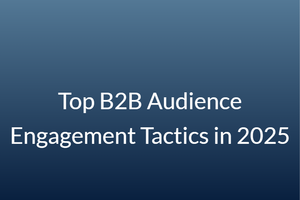Top B2B Audience Engagement Tactics in 2025
Cuerpo
Whether you're focused on brand awareness, lead nurturing, or pipeline acceleration, your ability to engage your B2B audience directly impacts campaign outcomes and long-term loyalty. This guide explores forward-thinking strategies you can implement today to master B2B Audience Engagement and drive lasting value for your brand.
1. Start with Hyper-Segmentation of Your Audience
Gone are the days of broad marketing lists. Today’s engagement begins with ultra-precise segmentation. By leveraging firmographics (like industry and company size) along with behavioral insights (such as download history or event participation), marketers can craft highly tailored engagement strategies.
This level of targeting enables marketers to create personalized messaging, improving open rates, click-throughs, and conversion opportunities throughout their B2B audience engagement journey.
Best Practice: Use AI-powered tools to segment your lists dynamically based on real-time behavior and predictive analytics.
2. Optimize Content for Each Stage of the Buyer Journey
The B2B buyer journey is complex, often involving multiple stakeholders and extended decision timelines. To maintain engagement, marketers must map content to each stage—from awareness to decision-making.
Top-of-funnel content may include blog articles, infographics, and social posts, while mid-funnel engagement benefits from webinars, whitepapers, and email nurturing. At the bottom of the funnel, case studies and product comparisons are key.
Best Practice: Audit your content quarterly to ensure full journey coverage and align with intent signals to power smarter B2B audience engagement.
3. Use Conversational Marketing for Real-Time Engagement
Chatbots and live chat aren’t just for B2C anymore. Conversational marketing enables real-time interaction, allowing brands to respond instantly to prospect inquiries, qualify leads, and provide value without delay.
This immediate feedback loop enhances B2B audience engagement by offering convenience and human-like support, especially when integrated with CRM and email systems for seamless follow-up.
Best Practice: Deploy AI-driven chat tools on your high-traffic pages, such as pricing, contact, or case study pages.
4. Deliver Thought Leadership Through Executive Branding
People buy from people—not faceless logos. One of the most effective B2B audience engagement tactics is elevating internal subject-matter experts as thought leaders. This humanizes your brand and establishes credibility in the market.
Executive branding on LinkedIn, featuring authored articles, Q&A sessions, and panel appearances, positions your team as industry pioneers while creating a deeper emotional connection with your audience.
Best Practice: Pair executive content with paid promotion to expand visibility to target accounts.
5. Incorporate Account-Based Experiences (ABX)
Account-Based Experiences (ABX) go beyond account-based marketing (ABM) by integrating marketing, sales, and customer success around a unified engagement strategy. ABX is about delivering personalized, cohesive experiences that evolve as the account progresses.
This model strengthens B2B audience engagement by providing continuity and relevance from initial touch to closed deal and beyond.
Best Practice: Align your CRM, marketing automation, and intent data to deliver timely and contextual touchpoints across functions.
6. Utilize Gamification to Keep Your Audience Engaged
Gamification adds an interactive and competitive element to your B2B strategy, encouraging active participation. Leaderboards, quizzes, reward points, and challenges make engagement fun—even in a B2B context.
For example, gamified assessments can help identify readiness for your solutions while educating prospects about your value proposition.
Best Practice: Integrate gamification into product demos, onboarding experiences, or educational webinars.
7. Focus on Video-First Engagement Across All Platforms
Video continues to dominate engagement metrics. B2B buyers increasingly prefer short, value-packed videos over dense PDFs or lengthy emails. From animated explainers to live Q&A sessions and customer success stories, video delivers information fast and in an engaging format.
B2B audience engagement is significantly boosted by multi-channel video use, including email campaigns, LinkedIn ads, and embedded website content.
Best Practice: Add personalized video messages from your sales team in follow-up emails to increase response rates.
8. Turn Data into Dialogue with Predictive Lead Scoring
Predictive lead scoring uses historical data and machine learning to determine which leads are most likely to convert. This helps your marketing and sales teams prioritize outreach efforts and optimize B2B audience engagement strategies.
By knowing who to target, when to engage, and what messaging works best, companies can improve pipeline quality and sales velocity.
Best Practice: Implement lead scoring criteria that include behavioral data like content views and webinar attendance, not just form fills.
9. Build Communities to Foster Brand Loyalty
B2B audiences value connection and shared learning. By creating exclusive communities—such as LinkedIn groups, member-only Slack channels, or customer advisory boards—you can establish a trusted space for dialogue and co-creation.
These communities act as engagement hubs, providing regular feedback, amplifying content, and enhancing peer-to-peer advocacy.
Best Practice: Host monthly community events or “Ask Me Anything” sessions to keep the conversation alive and interactive.
10. Track Engagement KPIs That Reflect Buyer Behavior
Engagement isn’t just about how many people see your content—it’s about what actions they take. Look beyond impressions and focus on engagement KPIs such as:
-
Email reply rate
-
Time spent on content
-
Webinar duration watched
-
CTA click-through rates
-
Event attendance follow-ups
These insights help refine future campaigns and improve overall B2B audience engagement.
Best Practice: Establish benchmarks for each KPI and use A/B testing to continuously optimize engagement strategies.
Read the Full Blog Now @ https://acceligize.com/featured-blogs/b2b-audience-engagement-best-practices/
About Us
At Acceligize , we specialize in high-impact B2B audience engagement strategies that accelerate lead generation and conversion. Leveraging intent-driven data, AI-powered segmentation, and multi-channel outreach, we connect your brand with the right decision-makers at the perfect time. Our end-to-end demand generation framework empowers marketing teams to drive qualified leads while ensuring each touchpoint delivers measurable results. Partner with us to turn engagement into revenue and build stronger, more meaningful customer relationships in the B2B landscape.










Comentarios